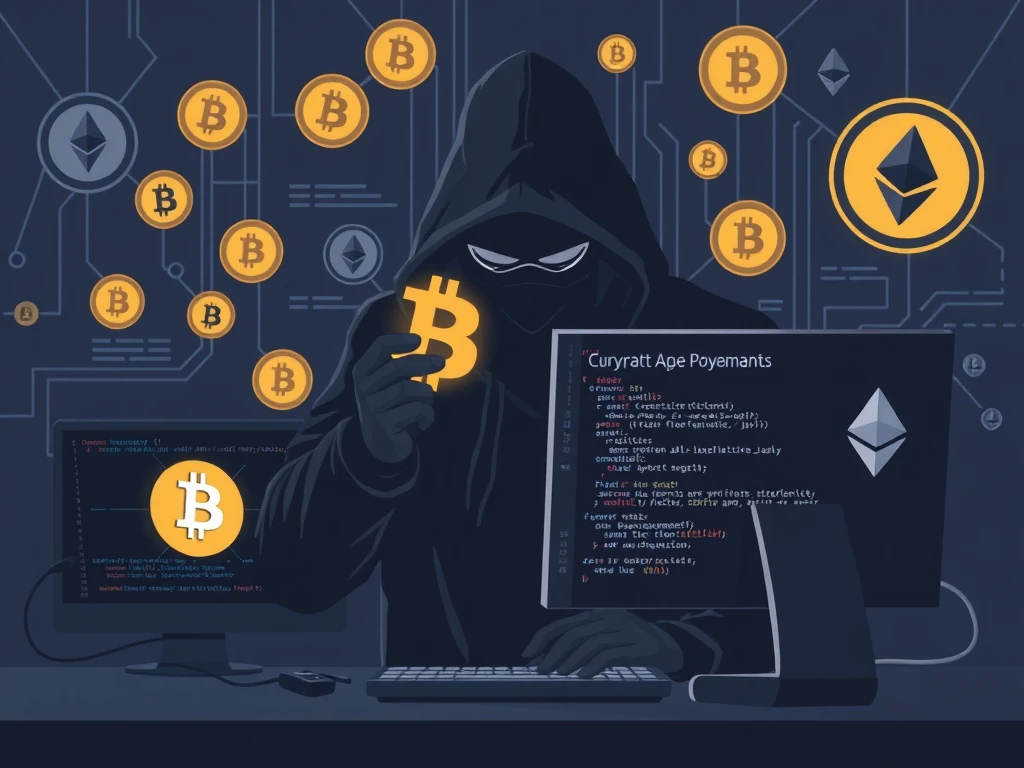Urgent Alert: North Korea Crypto Hack Targets Workers with Dangerous Malware

Attention, crypto professionals and job seekers! A serious threat is circulating, specifically targeting individuals in the blockchain and cryptocurrency space. A sophisticated North Korea crypto hack is actively deploying new malware through seemingly legitimate channels, putting your digital assets and personal information at significant risk.
What is This New Crypto Malware?
Security researchers at Cisco Talos have identified a new Python-based remote access trojan (RAT) they’ve named “PylangGhost.” This isn’t just any malicious software; it’s specifically designed to steal sensitive information, particularly targeting credentials for crypto wallets and password managers. PylangGhost is linked to a known North Korean hacking collective, sometimes called “Famous Chollima” or “Wagemole.”
This group has a history of targeting the crypto industry. Their latest campaign focuses on individuals with experience in cryptocurrency and blockchain technology, primarily in India, using elaborate social engineering tactics.
How Do These Fake Crypto Jobs Lead to Compromise?
The attackers employ a cunning strategy centered around fake crypto jobs. Here’s how the attack typically unfolds:
- Initial Contact: Victims are contacted by fake recruiters posing as representatives of well-known crypto companies like Coinbase, Robinhood, or Uniswap.
- Fraudulent Job Sites: They are directed to fraudulent websites that mimic legitimate company career pages or skill-testing platforms.
- Multi-Step Process: The process involves fake interviews and skill tests, building a false sense of legitimacy.
- Malicious Execution: During a fake video interview, victims are tricked into executing malicious commands, often under the guise of installing necessary software or drivers for the call. This action installs the PylangGhost malware.
This social engineering approach is highly effective because it preys on individuals actively seeking employment, who might be less suspicious of requests made during an interview process.
What Does PylangGhost Malware Steal?
Once executed, the PylangGhost malware provides attackers with remote control over the infected system. Its primary objective is data exfiltration, focusing on high-value targets for crypto users.
The malware is capable of stealing cookies and credentials from over 80 browser extensions. This includes a wide range of popular password managers and, crucially, cryptocurrency wallets. Some of the targeted wallets and managers include:
- MetaMask
- 1Password
- NordPass
- Phantom
- Bitski
- Initia
- TronLink
- MultiverseX
Beyond credential theft, PylangGhost can perform other surveillance and control functions, such as taking screenshots, managing files, stealing general browser data, collecting system information, and maintaining persistent remote access.
Why is Crypto Security Crucial Now?
This campaign underscores the constant threats facing the digital asset space. North Korean state-sponsored hackers are known for their persistent and sophisticated attacks targeting cryptocurrencies, viewing them as a vital source of funding. The use of fake crypto jobs is a recurring tactic for these groups, highlighting the need for extreme caution when interacting with unsolicited job offers or recruitment processes in the industry.
How Can You Protect Yourself from This North Korea Crypto Hack?
Staying safe requires vigilance and proactive security measures. Here are some actionable insights:
- Verify Job Offers: Always verify job opportunities directly through official company websites. Be suspicious of unsolicited contact or offers that seem too good to be true.
- Be Wary of Downloads/Commands: Never download or execute files or commands provided during an interview or recruitment process, especially if they require elevated permissions or seem unrelated to standard application procedures.
- Use Hardware Wallets: For significant holdings, consider using hardware wallets, which keep your private keys offline and are much harder for malware to compromise.
- Use Strong, Unique Passwords: Employ strong, unique passwords for all your crypto accounts and password managers.
- Enable 2FA/MFA: Always enable two-factor or multi-factor authentication on exchanges, wallets, and email accounts.
- Keep Software Updated: Ensure your operating system, browser, and security software (antivirus) are always up to date.
- Be Skeptical: Maintain a healthy level of skepticism regarding any requests for sensitive information or actions during online interactions.
Conclusion: Stay Vigilant Against Crypto Malware Threats
The emergence of the PylangGhost malware and its deployment via fake crypto jobs serves as a stark reminder of the persistent and evolving threats from groups like Famous Chollima. As the crypto industry grows, so does its attractiveness to malicious actors, including state-sponsored entities like those in North Korea. Protecting yourself requires staying informed about current threats, practicing rigorous crypto security habits, and verifying the legitimacy of all online interactions, especially those involving potential employment in the blockchain space. Stay safe and secure your digital assets.







